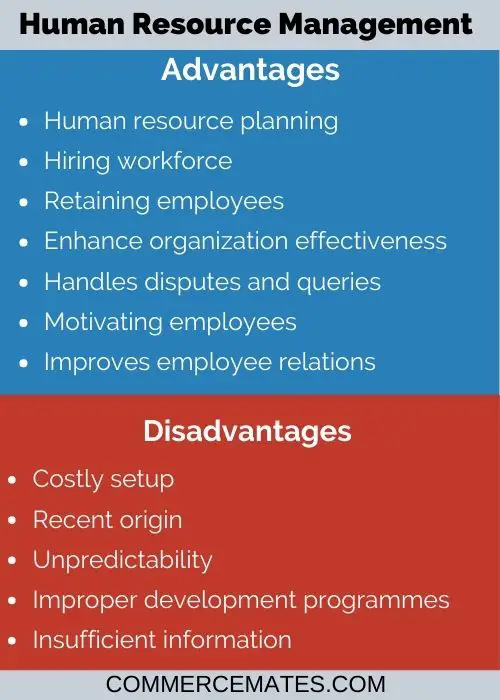Contents
Meaning of Human Resource Management
Human resource management refers to management of employees working within the organization. It is part of management which aims at maintaining efficient and competent workforce. Human resource management involves wide range of activities such as hiring, training, motivating, fixing compensation, promoting and firing employees.
Advantages of Human Resource Management
Human resource planning
Human Resource Management(HRM) helps in estimating the right number of people required for carrying out the necessary activities of an organization. It analyses different work positions within a business for identifying the skill sets needed for such positions. Proper information regarding job designations helps in acquiring the right peoples.
Hiring workforce
It enables business in hiring skilled and qualified workforce by creating a large pool of competent peoples. Human Resource Management conducts whole recruitment process of an organization in accordance with the requirements of job positions.
Retaining employees
Human Resource Management plays an efficient role in retaining skilled employees for a longer term within an organization. It monitors working environment provided to workers and ensures that they get hygienic working place, better remuneration, extra benefits and facilities. This leads to long term associations of workers with organization.
Enhance organization effectiveness
Human Resource Management influences the overall productivity and profitability of a business organization. It is the one which monitors the allocation of all resources and ensures that they are full utilized with minimum wastage. Human Resource Management matches right person with right job which improves the effectiveness of an organization.
Handles disputes and queries
It handle disputes and resolves all queries of workforce from time to time. Human Resource Management leads to smooth functioning of an organization by redressing all problems of employees in a better manner.
Motivating employees
Motivation of employees towards their roles is must for achieving the desired goals and objectives. Human Resource Management motivates workforce by rewarding them as per their performance and providing welfare facilities. It examines their output level for deciding their incentives which boost the overall morale of workers.
Improves employee relations
HRM focuses on establishing good relations among management and labors for ensuring continuity of business. It provides fair remunerations to workers and take cares of all their necessities. Human Resource Management builds up better coordination in between employer and employees by considering their ideas and suggestions in policy making.

Disadvantages of Human Resource Management
Costly setup
Human Resource Management systems require huge costs for installation within the business origination. Owners need to give proper training to its workers for setting up and running these systems. Small business can’t afford to run these systems within their operations.
Recent origin
Human Resource Management lacks universal approval academic base due to its recent origin. There is no uniformity in its terms and different people characterize the term in a distinct way. Organizations are renaming their workforce department as HRM which may not yield real results. It requires changes at a fundamental level in approaches, mentality and philosophy of management.
Unpredictability
Another major limitation is inability to predict the external events and behavior of peoples. HRM needs a full support of all working people and top management in an organization for its successful implementation. In absence of proper support from top management, it may not yield expected results.
Improper development programmes
HRM requires implementation of development programmes such as on job training, career planning, counselling, MBO etc. within the organization. In actual, these development programmes are limited to classroom lectures which undermine this approach in providing the expected outcomes.
Insufficient information
Lack of essential information about workers adversely affects the performance of Human Resource Management systems. These systems require proper database of employees before implementing them. Many organizations do not maintain a proper data of their workforce and therefore need to acquire, retrieve and store the required information.